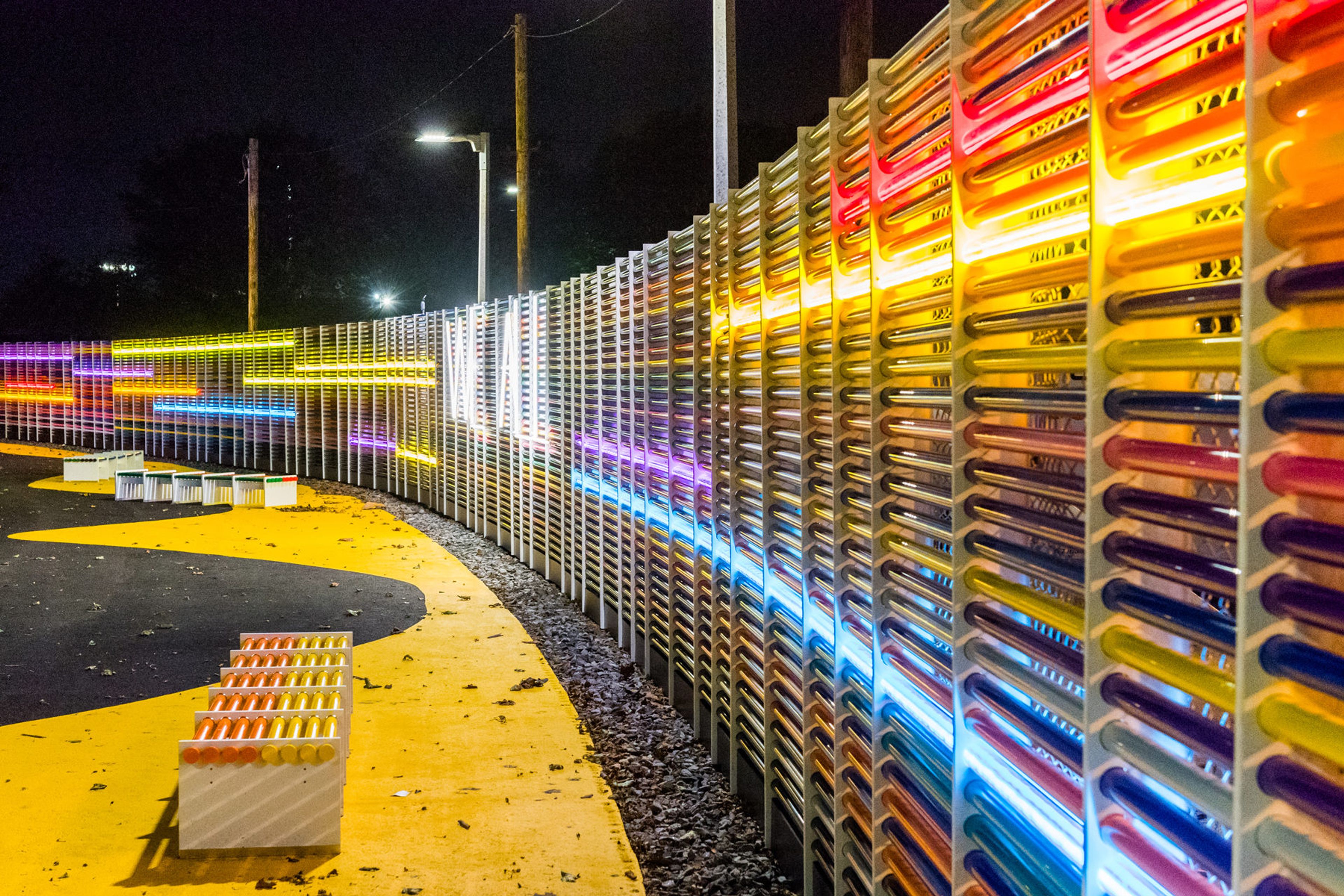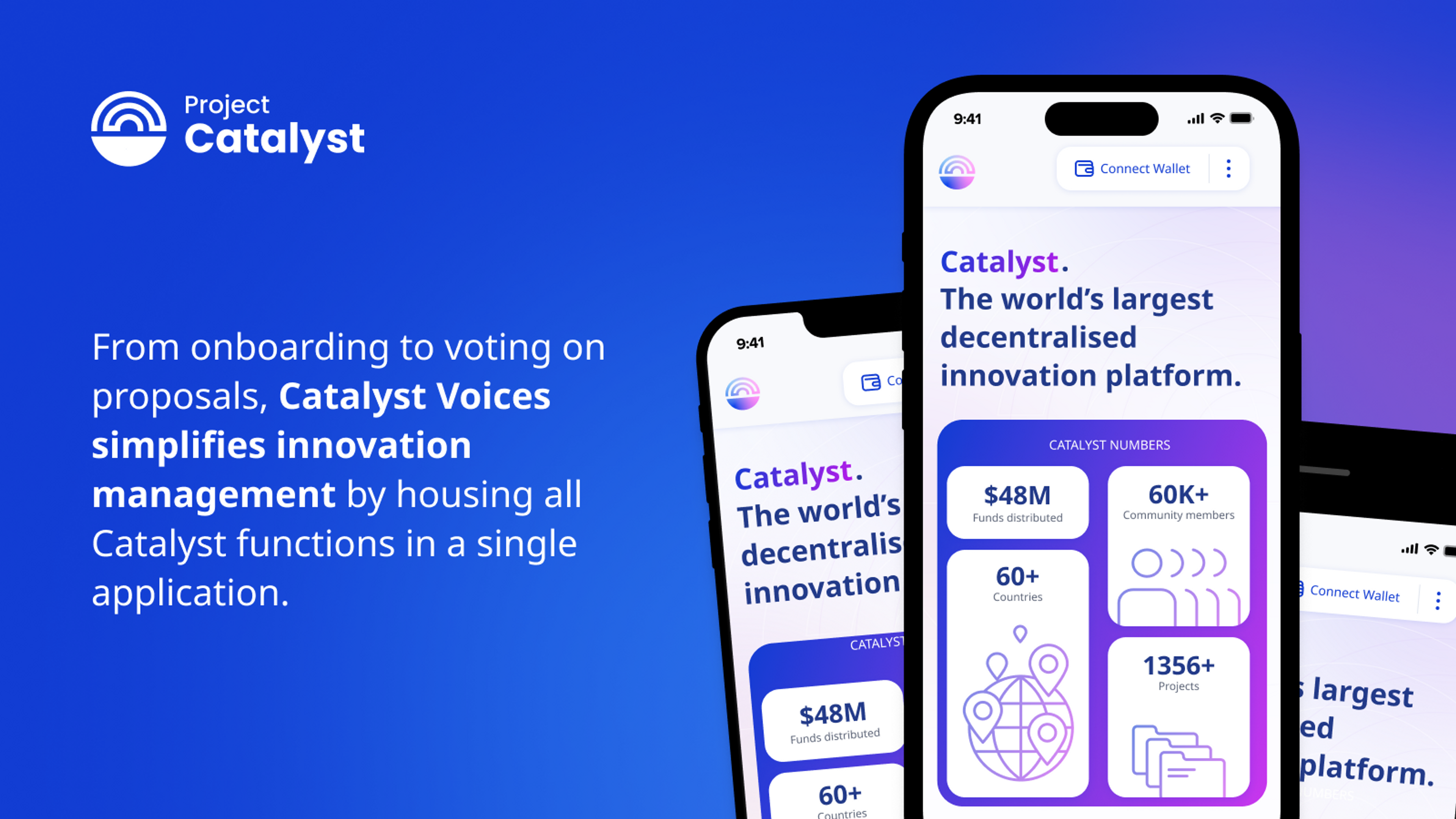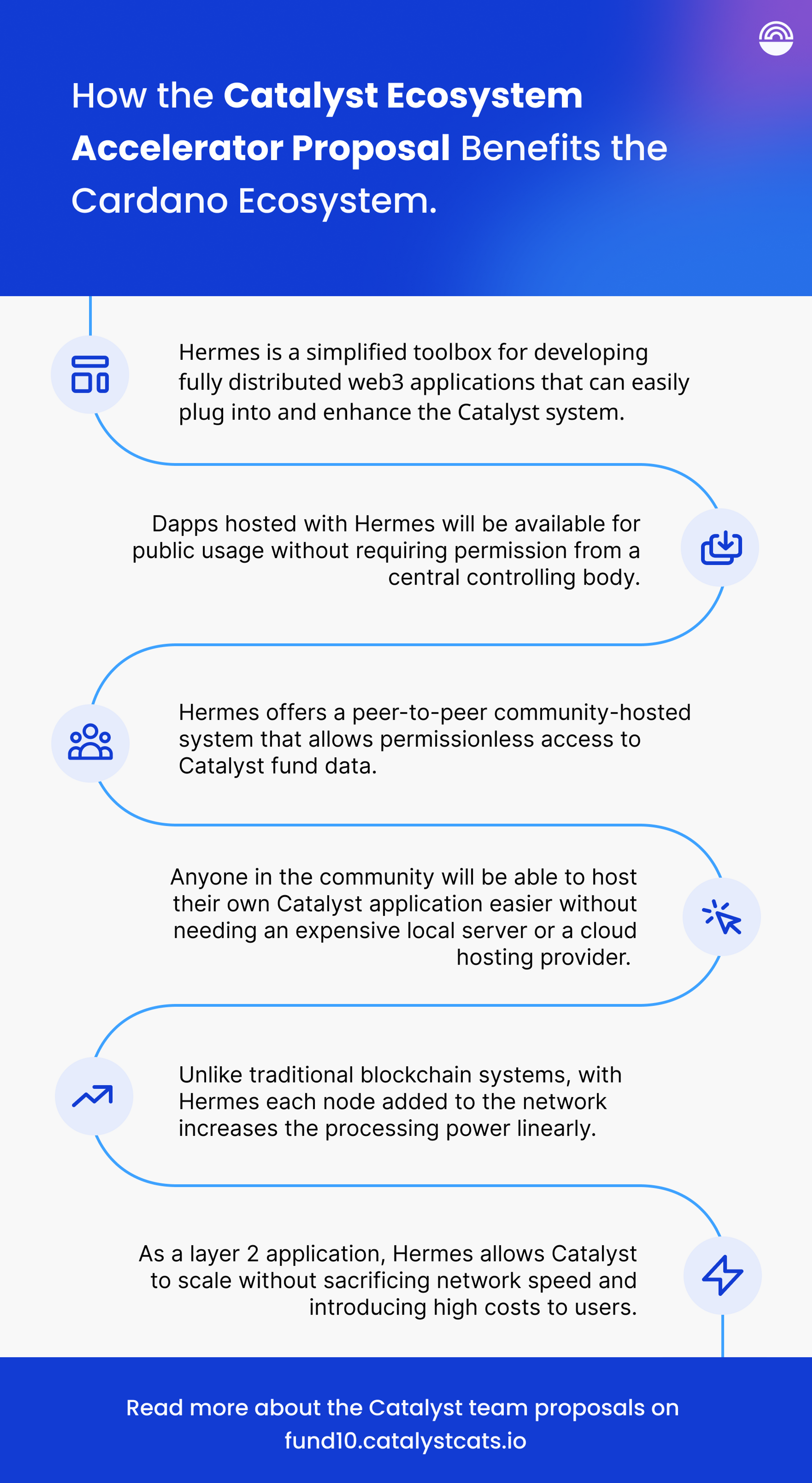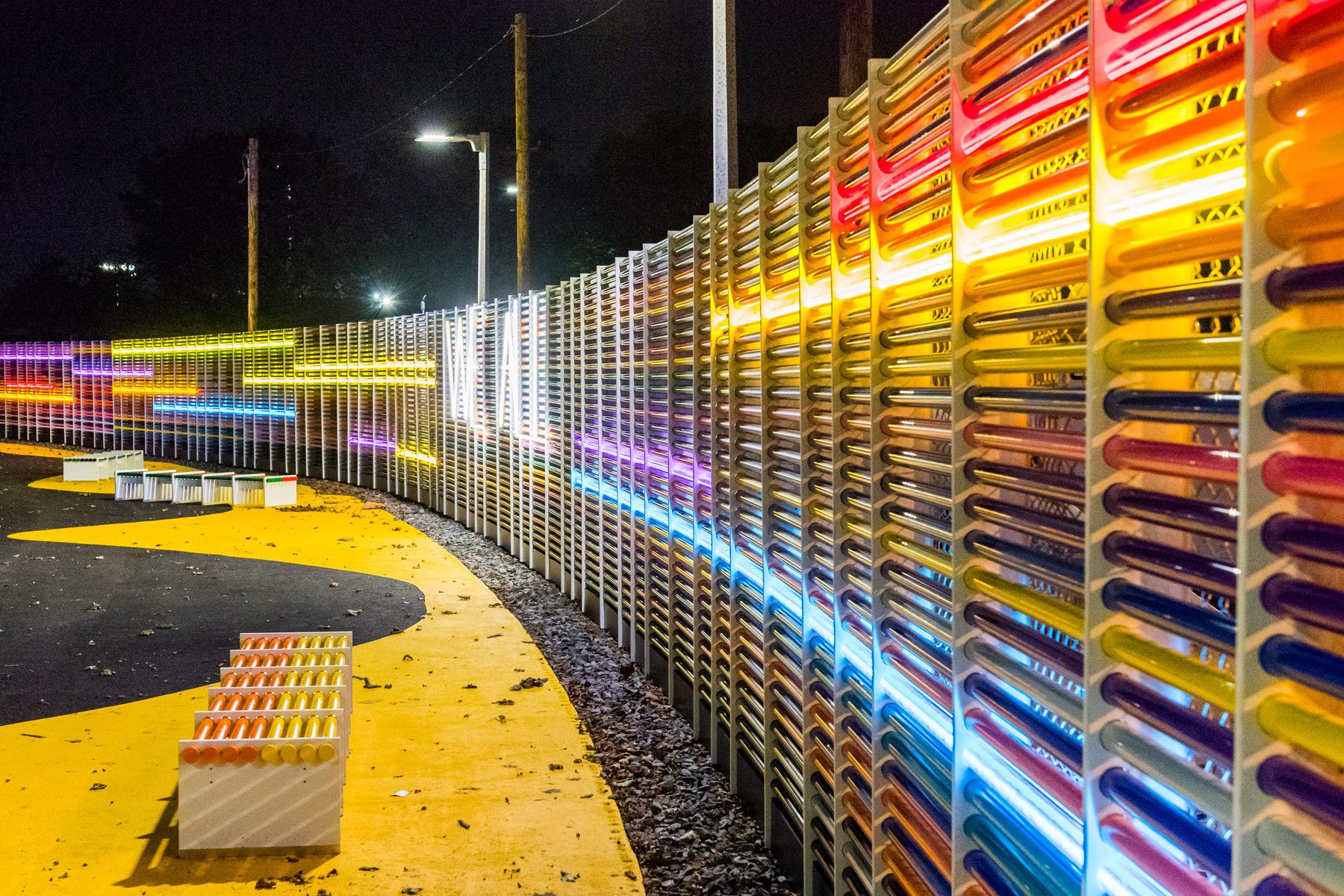
Image credit: “WE ALL,” designed by Francisco Alarcon (MDes '18), Carla Ferrer Llorca (MDes '17), and Rudy Weissenberg (MDes '18) for the Grove in Allston.
What is Project Catalyst?
Project Catalyst is Cardano’s innovation engine to foster the highest levels of human collaboration in funding Cardano ecosystem development at the grassroots level.
Project Catalyst is an innovation grants program like no other, enabling the Cardano community to ideate, collaborate, and give feedback on each other's proposed project ideas before ultimately voting on which ideas should receive funding. Project Catalyst draws resources from the Cardano treasury to fund approved projects that have achieved community consent.
In three years, Project Catalyst has run ten rounds of the innovation program and provided funding for over 1,100 projects put forward by teams and individuals distributed across the global network of participants.
As Fund10 draws toward its exciting conclusion, with many valuable lessons learned throughout Catalyst’s lifetime, this is the perfect opportunity to reflect on the progress. More than 600 Catalyst-funded projects have already fulfilled their commitments by demonstrating proof of completion of their goals. This is a staggering achievement that bucks the trend of traditional business incubators and accelerators.
Fund10 also marks the first time IOG's Catalyst team seeks funding to fulfill its roadmap and future vision. Among the highest priorities are optimizing the existing voting system infrastructure, radically transforming the proposal, review, and voting experiences, and advancing collaborative human processes with knowledge transfer initiatives.
Helping to grow Cardano’s grassroots grant-making ecosystem is a labor of intense dedication for the IOG team, who count themselves as peers among the many contributors to the Cardano project. Catalyst has grown from its early origins into a true community of its own, populated by people who show up weekly to share their time, interests, and opinions through the town halls and after-town hall discussions, ultimately leading to more people learning and working together.
The team deeply understands that progress in Catalyst requires leveraging collective experiences from every pocket of the community, with a significant commitment to promoting all voices and a solid drive to support innovation.
IOG created and funded Project Catalyst to bootstrap a grant program for grassroots, community-led innovation to benefit the entire Cardano ecosystem. After three years in operation, the community now has choices about whether the existing Catalyst team should continue its administrative functions or if a new direction is preferred.
Fund10’s ‘Catalyst fund operations category’
The Catalyst fund operations category works differently from normal challenges, as there will only be one approved service provider to fulfill the administrative operations of Cardano’s grassroots innovation fund.
Because of this, a change to the election schema will be applied to provide a clear winner. This will be the first time that a 'winner takes all' (or 'grand prize') approach method will be used since Fund1.
Fund10 parameters state that voters voting in the Catalyst fund operations category will be presented with ‘yes’ or ‘abstain.’ The “one winner takes it all” approach provides a more straightforward, sincere voter strategy by having just ‘yes’ or ‘abstain’ options. The classical scheme of ‘yes’, ‘no’, or ‘abstain’ is more efficient for a program with multiple winners. In the classic Catalyst challenges setup, abstaining means not casting either a ‘yes’ or ‘no’ vote on a proposal in the Catalyst voting app.
Catalyst is critical for Cardano, and it should be run by the team most trusted by the community. The schema will reveal the team the community trusts to run Catalyst, whether the current team or another one selected by the ada-holding community.
The goal here is a self-funded and self-sufficient innovation ecosystem predicated on the Cardano community's decisions on where to prioritize innovation funding. The Catalyst fund operator category proposal with the most positive votes will receive funding from the treasury to resource operations and execute its plan.
Cardano belongs to all ada holders, so decisions about how the grassroots ecosystem grows and in which direction to take the innovation fund should be in the community’s hands. Ultimately, a self-funded Catalyst operation is the very definition of a sustainable flywheel of innovation.
IOG Catalyst team’s Catalyst fund operations proposal
The Catalyst fund operations proposal from the IOG Catalyst team outlines a practical strategy to manage Project Catalyst over the upcoming year. This plan entails conducting three funding rounds while upholding all the proposed features and services. The funding requested to sustain Catalyst for twelve months was meticulously evaluated and budgeted based on well-defined expenses associated with responsibly and proficiently overseeing Catalyst. This approach reflects the team's knowledge, experience, and available infrastructure.
It makes sense for the team to allocate costs on a fund-by-fund basis to assure the community that Funds 11, 12, and 13 will be delivered over the next 12 months, highlighting what is required to do this in practice. If Catalyst is not appropriately funded, expecting the services described to be delivered competently is unrealistic.
The main goals of the team’s Catalyst fund operations proposal are to:
- Coordinate, launch, and fully execute the subsequent three Catalyst funding round campaigns at circa 50m ada per fund to produce circa 1,200 new projects funded via Catalyst over the next twelve months.
- Maintain all existing Catalyst voting system infrastructure and tools to be readily available during each funding round.
- Coordinate and manage the milestone-based funding and proof-of-achievement accountability model to onboard newly approved projects and oversee the ongoing funding disbursement requirements for all pre-existing, active projects from Fund2-Fund9 and all newly approved projects (Fund10-Fund13).
- Initiate an education program to help onboard new participants and enable growth in community-led competencies to cooperate with Catalyst.
- Deliver mid- and end-of-term evaluations of project outcomes to demonstrate the significance and impact Catalyst has achieved during the project's scope.
- Create an arms-length relationship between the operation and administration of each Catalyst funding round (Catalyst operator) and the custody of funds allocated from the Cardano treasury for each round (Catalyst funding vehicle).
The full proposal details can be read here.
What the Catalyst team has delivered
The Catalyst team has over 20 core contributors, primarily full-time IOG employees. The Catalyst leadership and core team carry the technical expertise to manage, develop, and maintain the delivery of technology innovation programs at scale.
In collaboration with community groups, a public square for global grassroots innovation has been constructed – a communal space for every ada holder to exchange ideas, challenge themselves, and collaborate on shaping the future of Cardano.
From building technologies and processes for an open and decentralized innovation funding incubator to facilitating constructive community-focused channels for collective ideation and collaboration, the bedrock of the Catalyst team’s values is resoundingly ‘for the people, by the people’ – a tenet necessary for true decentralized decision-making and grassroots innovation.
To date, more than 1.7 million votes have been cast, deciding how to allocate over $48m worth of ada from the Cardano treasury, with a further 50m ada available for Cardano community innovation projects, this time in Fund10. Throughout that time, Catalyst never suffered any critical exploits preventing voting from happening legitimately.
The Catalyst team has always put the needs of ada holders first in its work toward building an environment that embraces inclusivity and a wide range of perspectives. Significant efforts are made to collect a wealth of data and feedback on areas for improvement. The team has devised a calculated roadmap that hopefully garners community confidence and support.
The power of lively creativity, collective intelligence, empathy for one another's endeavors, and rationality are all ingredients for building a trusted and transparent community-led innovation platform. There are natural differences of opinion on how things should be done. However, we can all agree Catalyst must be designed to enhance blockchain-based voting and defining priorities for startup projects that both embrace the ada economy and grow the adoption of Cardano.
Forging the road ahead
Two technical development proposals have also been submitted to Fund10 in the Catalyst systems improvements category that set out the technology roadmap to advance the state of the art for the Catalyst voting system.
The proposals are an ambitious and innovative plan that firstly addresses the pressing need to harmonize the Catalyst user experience and, secondly, advances the underlying Catalyst technology architecture, which dually solves problems faced by all DApp developers. TL:DR blockchain developers still require centralized Web2 infrastructure to run their applications. The Catalyst ecosystem accelerator proposal will produce a revolutionary distributed voting application development approach.
IdeaScale replacement and web browser-based voting center with liquid democracy, aka ‘Catalyst Voices.’
Catalyst Voices unifies Catalyst in a straightforward browser-based interface. The requested funding will replace the current patchwork system composed of wallets, IdeaScale, standalone web apps, and today’s Catalyst mobile app with an open-source collaboration platform for proposing projects, reviewing, and voting.

Community feedback has demonstrated that today’s Catalyst suffers from an overly complex and disjointed user experience for many users. Reducing barriers to meaningful participation in Catalyst will ultimately improve and grow the collective decision-making capabilities of voters, representatives, and proposers.
A proof of concept prototype demonstration of the liquid democracy capabilities that Catalyst Voices will deliver can be found in this video showcase of Catalyst Voting Center prototype features. This Catalyst Voices proposal will bring to life the first instance of delegating voting power to Catalyst delegate representatives (DReps), whose concept can be found in this blog about Catalyst Dreps
The full proposal details can be read here.
Catalyst ecosystem accelerator
The Catalyst team’s ‘Catalyst ecosystem accelerator’ proposal will radically improve the current Catalyst infrastructure by addressing performance, scalability, inclusivity, speed, and parallelism while maintaining secure and private voting.

Under this proposal, the new infrastructure will deliver ‘Hermes’ a high-availability blockchain voting database, and ‘Athena’, a hyper-lite, high-speed voting DApp, as the first reference DApp to demonstrate these new enabling capabilities.
The benefits of the Catalyst ecosystem accelerator components include:
- A toolbox for developing fully distributed Web3 applications that can easily plug into and enhance the Catalyst voting system.
- Hosted DApps are available for public use without permission from any central controlling body.
- A peer-to-peer, community-hosted system that allows permissionless access to Catalyst fund data.
- Anyone can host their own DApps without needing an expensive local server or a cloud hosting provider.
- Unlike traditional blockchain systems, each node added to the network increases the processing power linearly.
- Layer two application that allows Catalyst to scale without sacrificing network speed and introducing high costs to users.
The Catalyst ecosystem accelerator is a powerful and accessible tool for all developers in the Cardano ecosystem to use. DApp authors can use the engine to develop fully decentralized, voting-enabled applications while lowering operating costs to run and host those apps.
This dramatically enhances accessibility by reducing the barriers to entry to builders across the ecosystem and would see the capabilities deployed alongside the existing Catalyst voting system stack tested using the testnet environments in the standardized testing and validation approach before deploying into production. This would further allow these innovations to safely and successfully coexist with the existing tech stack without disrupting an active Catalyst funding round, forming part of an orderly upgrade to Catalyst once the capabilities are developed.
The full proposal can be read here.
Looking beyond Fund10
The Catalyst team’s proposals submitted in Fund10 lay the foundations for a self-sufficient Catalyst innovation program and its necessary technologies. This is just the start of moving Catalyst from evolution to revolution.
The Catalyst systems improvements category has been established to prioritize what features the community wants to see developed to advance the state-of-the-art of the Catalyst innovation funding platform. This means that, in Fund11, there will be another opportunity for community builders to submit proposals for feasibility evaluation.
Equally, the team is humble and recognizes that it needs support from community collaborators to complete the roadmap to a feature-complete Catalyst. Simply put, we are better if we’re building together.
The Catalyst Team intends to submit new proposals in subsequent funding rounds to enable more features to be developed. It will be among the first institutions to use governance action proposal processes for proposing that resources are made available to support the growth of Catalyst community contributions, making advances on the ambitions to realize a plan of highly motivated, incentivized, and distributed community members and employees building and operating Catalyst together.
Community presence, engagement, and consent
This defining moment in Cardano's history depends on community consent to evolve Catalyst into a self-sustaining and transformational innovation incubator where the Catalyst team will serve as a member of and service provider for the Cardano community. Catalyst must move from experimentation to becoming a vital Cardano institution working alongside other institutions like Intersect, community guilds, and alliances.
All ada holders have the right to explore every possibility for innovation and growth on Cardano, and it is through Catalyst that participants are empowered to pursue their interests, take action, and unlock their true potential.
These three proposals from the Catalyst team illustrate the importance of becoming a self-governing stakeholder with a solid vision that continues to play a vital role in seeding an explosion of innovation and productivity on Cardano. All for future ecosystem growth, funding projects to create new and better blockchain-based products and services, and a few that may change the world someday!
Voting begins on August 31 and ends on September 14. If you have registered to vote, please download the Catalyst voting application from the Google Play Store or iOS App Store.
With your permission, the Catalyst Team would like to stand up and be counted by the same yardstick measures as all other Catalyst proposers. The hope is for you to approve this roadmap to forge the path forward together.
How to get involved?
Do you want to take an active part in Project Catalyst? The first step is visiting ProjectCatalyst.io for more information.
For regular updates on the progress of Project Catalyst, please subscribe to the Catalyst mailing list and join the Discord and Telegram communities.

